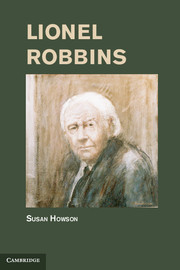Book contents
- Frontmatter
- Contents
- Illustrations
- Abbreviations
- Introduction
- One Father and Son
- Two The Great War
- Three Postwar
- Four The London School of Economics
- Five Iris Gardiner
- Six New College Oxford
- Seven The Young Professor
- Eight Fritz and Lionel
- Nine The School in the Mid-1930s
- Ten The Approach of War
- Eleven The Economics of War
- Twelve Director of the Economic Section
- Thirteen Anglo-American Conversations
- Fourteen The Law Mission and the Steering Committee
- Fifteen 1 9 4 4
- Sixteen The Last Months of the War
- Seventeen The Postwar Settlement
- Eighteen Return to the School
- Nineteen The End of the Transition
- Twenty LSE in the Early 1950s
- Twenty-One Chairman of the National Gallery
- Twenty-two Lord Robbins
- Twenty-three The Robbins Report
- Twenty-four The Sixties
- Twenty-five The Arts
- Twenty-six The Troubles at LSE
- Twenty-seven Retirement
- Conclusion
- Bibliography
- Index
Twenty-two - Lord Robbins
Published online by Cambridge University Press: 07 October 2011
- Frontmatter
- Contents
- Illustrations
- Abbreviations
- Introduction
- One Father and Son
- Two The Great War
- Three Postwar
- Four The London School of Economics
- Five Iris Gardiner
- Six New College Oxford
- Seven The Young Professor
- Eight Fritz and Lionel
- Nine The School in the Mid-1930s
- Ten The Approach of War
- Eleven The Economics of War
- Twelve Director of the Economic Section
- Thirteen Anglo-American Conversations
- Fourteen The Law Mission and the Steering Committee
- Fifteen 1 9 4 4
- Sixteen The Last Months of the War
- Seventeen The Postwar Settlement
- Eighteen Return to the School
- Nineteen The End of the Transition
- Twenty LSE in the Early 1950s
- Twenty-One Chairman of the National Gallery
- Twenty-two Lord Robbins
- Twenty-three The Robbins Report
- Twenty-four The Sixties
- Twenty-five The Arts
- Twenty-six The Troubles at LSE
- Twenty-seven Retirement
- Conclusion
- Bibliography
- Index
Summary
Events in 1959 were to determine the pattern of Lionel Robbins’s life for the next decade. One event was his elevation to the peerage; another was his joining the board of directors of the Financial Times newspaper. He and Iris bought a small house at Lyme Regis in Dorset, where they spent their free weekends and vacations, often with their children and an increasing number of grandchildren. To his commitments were added in 1960 the chairmanship of the Academic Planning Board for a new university at York, another term as a trustee of the National Gallery and, towards the end of the year, invitations to serve as a government appointee on the board of the partly government-owned British Petroleum Company and to chair a major enquiry into the present and future of higher education in Great Britain. At LSE, although the School remained his ‘main preoccupation’ and he found ‘the work here in the last few years especially rewarding…[because of] the excellence of the younger people’ (LCR to Röpke, 15 April 1959, Economists Correspondence May 1958-December 1959, RP), his dominance of the Economics Department had been challenged by the ‘younger people’ from the mid-1950s. The events of 1959 led to the loss of his chair of economics in 1961. Before that happened, however, the vexing problem of the reform of the BSc(Econ) was resolved in the winter of 1959/60.
When Robbins accepted the offer of a life peerage he wanted to become simply ‘Lord Robbins’ and to be known in academic circles as Professor Lord Robbins or just Robbins like Keynes. He received many congratulations (Peerage Congratulatory Letters, RP): from friends in the arts world who thought it was a great day for the arts in Britain, from fellow economists who were pleased to have one of their number in the upper house, from LSE colleagues and former students who were proud for the School as well as from other friends. Former colleagues in wartime Whitehall who knew he had refused a knighthood in 1943 were delighted an acceptable honour had been found: ‘Some of us,’ wrote Dennis Proctor on 24 January, ‘have conferred together about it in private, but I at least had not hit on this brilliant solution.’ Several wondered what name he would take. Arthur Salter warned him on 26 January not to ‘let anyone persuade to take any name but your own. They tried it on with me but I was determined not to inflict on those who had known me as Salter the job of finding [me] under the mask of Lord Abcadabra or something.’
- Type
- Chapter
- Information
- Lionel Robbins , pp. 826 - 857Publisher: Cambridge University PressPrint publication year: 2011

